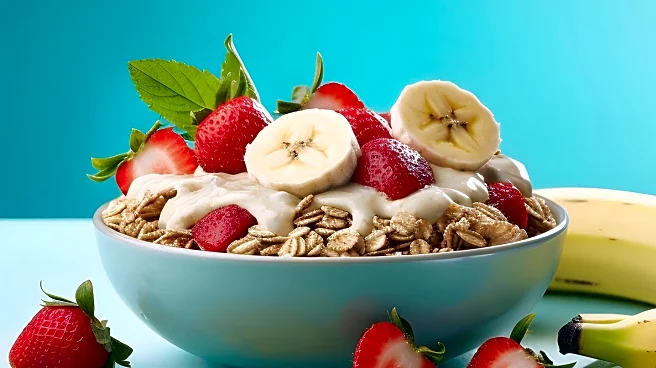What's Happening?
A nutritionist specializing in gut and hormone health, Jasmine Bliss, has provided insights into the health implications of consuming cereal as part of a balanced diet. According to Bliss, while cereal can be a convenient and fortified source of nutrients like iron and B vitamins, its health value varies significantly across different products and brands. Many cereals are ultra-processed, high in added sugars, and low in fiber and protein, which can lead to quick spikes in blood sugar levels and subsequent hunger. Bliss emphasizes the importance of reading nutrition labels to identify healthier options, which are typically higher in fiber, lower in added sugars, and made from whole grains. She suggests pairing cereal with protein sources and healthy fats to maintain stable blood sugar levels and provide longer-lasting energy.
Why It's Important?
The discussion around cereal's health impact is significant as it addresses common misconceptions about breakfast foods and their nutritional value. With many cereals marketed aggressively as health foods, consumers may be misled into believing they are making nutritious choices. Understanding the nutritional profile of cereals can help individuals make informed decisions that contribute to better health outcomes, particularly in managing blood sugar levels and maintaining energy throughout the day. This information is crucial for families and individuals seeking to improve their dietary habits and avoid the pitfalls of consuming ultra-processed foods.
What's Next?
Consumers are encouraged to become more vigilant in reading nutrition labels and selecting cereals that align with their health goals. Bliss advises pairing cereals with protein-rich foods and healthy fats to enhance their nutritional value. Additionally, making homemade granola or opting for alternatives like overnight oats can provide a healthier start to the day. As public awareness grows, there may be increased demand for cereals that prioritize whole grains and lower sugar content, potentially influencing market trends and product offerings.
Beyond the Headlines
The broader implications of this discussion highlight the need for transparency in food marketing and the importance of consumer education in making dietary choices. As more individuals become aware of the health risks associated with ultra-processed foods, there may be a shift towards more natural and minimally processed options. This could lead to changes in industry standards and regulations, particularly concerning the marketing of breakfast cereals and other packaged foods.










